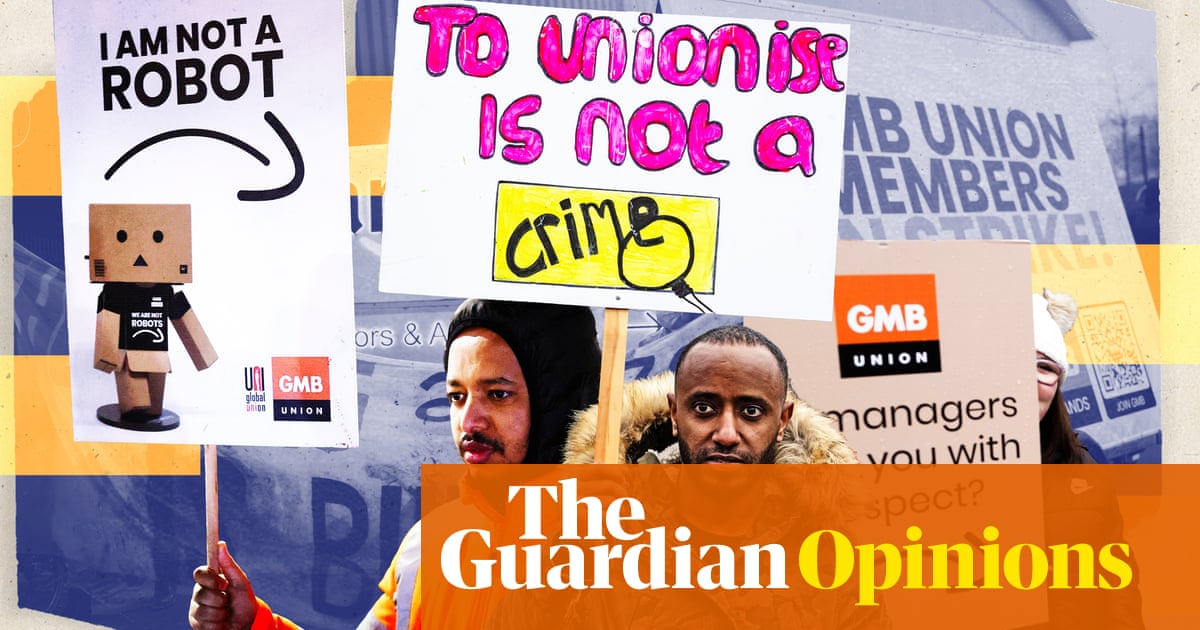
Timed to go to the toilet. Told off for leaning. Monitored for each package completed. As a worker at Amazon, I often feel that we aren’t being treated as people.
But for me, the moment I knew we needed to go on strike was when we were told we’d be getting a pay rise of just 50p extra an hour. We came into work one day and the managers were holding briefings – telling us that this was all we were going to get, and that we shouldn’t expect anything better. Just 50p extra, when we’re facing rising prices in every shop and energy bills going through the roof. The company describes the offer as “competitive pay”, pointing out that we get employee benefits on top of the hourly wage. Yet the company is making millions – if not billions – for the people at the top.
Everyone who I work with at the warehouse in Coventry is frustrated. Frustrated at bad pay, at the long hours we have to work just to make ends meet, and at sky-high profits that we don’t see any benefit from. The shifts are hard work, spent all on our feet, walking miles back and forth through large warehouses. All of that for just £10.50 an hour. That’s why about 400 workers at our warehouse are striking today.
We are treated worse than the robots doing automated tasks in the warehouses. If the robots have an issue, the company pays for them to be serviced, whereas if we drop below certain targets multiple times, we can be fired – we have to sort it out or get out. (The company says that its system “recognises great performance”, and that it offers “coaching” to employees who aren’t meeting targets.)
If you take too long to find a toilet in the huge warehouse, managers will ask you for account for this time – using doublespeak to describe it as being “idle”. Which other workplace would tolerate this? We are people, sometimes we need to use the toilet. How can this be a reasonable thing for a manager to ask about in a 21st-century workplace in Britain?
And it isn’t as though Amazon is struggling for cash. In the UK last year, it made £204m in profit before tax. Its owner, Jeff Bezos, is one of the richest men on the planet, with enough money to fly to space.
The company’s profits shot up during Covid. As the high street was closed, people relied on ordering things online. We were still in the back end of the warehouses working, and Bezos was still making money – even more money than before. From 2019 to 2020, profits nearly doubled to $21.3bn (£17.7bn) and rose again for 2021 to $33.4bn.
At the start of 2021, Amazon could have given every one of its workers across the world a £43,000 bonus out of the increase in profits, and Bezos would still have had more money than pre-pandemic.
We were offered a 50p-an-hour increase in August. But with the cost of living soaring, inflation at 10.1% and conditions in the warehouses harder than ever, we are clear – a 4.8% pay rise isn’t good enough. We deserve a £15-an-hour wage. It isn’t as though Amazon can’t afford it. Amazon relies on its workers. Without us the business couldn’t run. But it refuses to talk to our union – it has not recognised it, and says that “a tiny proportion of our workforce is involved” in strikes. Yet at Coventry, more than a quarter of workers will be striking today.
I see colleagues falling asleep on the bus to and from the depot. They are exhausted from the long hours, the physical nature of the job and the shift patterns they have to work to make ends meet. It can’t go on.
Darren Westwood works at Amazon’s Coventry warehouse and is a member of the GMB union












